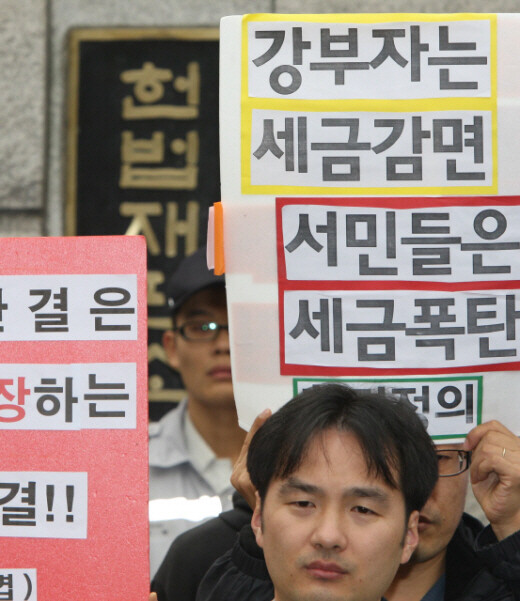hankyoreh
Links to other country sites 다른 나라 사이트 링크
Highest income earners in S.Korea have low tax burden among OECD nations

According to a National Assembly Budget Office (NABO) report, the real tax burden for South Koreans in higher income brackets fell far below the average for Organisation for Economic Co-operation and Development (OECD) member countries in 2009. The gap in 2009, when the Lee Myung-bak administration’s tax cut policies entered full swing, was found to have widened from the year prior.
A NABO comparison of international effective income tax rates was released Tuesday following a request by New Progressive Party (NPP) Lawmaker Cho Seung-soo. The report showed that the effective tax rate in 2009 for the average single Korean wage earner with no children was 11.8 percent of income, the lowest rate of any OECD member nation save Mexico. The figure is also substantially lower than the 25.6 percent average for the 30 comparison countries.
The effective tax rate refers to the tax burden actually levied on citizens after various deductions and reductions have been factored in. The data in the report were based on the OECD’s “Taxing Wages 2009.”
The effective tax rate difference between South Korea and the other countries examined was especially large in the case of the income tax burden. South Korea’s social insurance burden of 7.6 percent, including employment insurance, was 2.1 percentage points lower than the average for comparison nations, but the income tax burden, at 4.2 percent, was a full 11.7 percentage points lower than the average.
The tax burden in South Korea also falls even farther below the OECD member nation average in the case of higher income brackets. The 2009 tax rate for high income earners, namely those with incomes 167 percent of average income or higher or with annual income of 58 million Won ($46.8 thousand) or more, was 15.2 percent of income, some 16.2 percentage points lower than the OECD average of 31.4 percent.
In the cases of low-income earners, those making 67 percent of average income or with annual income of 23 million Won or lower, and average earners, those with yearly salaries of 35 million Won, the difference is just 12.1 percentage points and 13.8 percentage points, respectively. This indicates that the richer South Koreans are paying less by a wide margin, compared to taxpayers in other countries.
“South Korea’s tax system has a lot of deductions, so in some respects it works in favor of high income earners,” said a NABO official.
The 2009 tax rate for high-income earners was down from its 2008 level due to factors including tax cuts proposed by the Lee administration. The difference in tax burden for high-income earners relative to the OECD average widened to 16.2 percentage points in 2009 from 16.0 percentage points in 2008. Meanwhile, the difference narrowed by 0.2 percentage points and 0.3 percentage points, respectively, for low-income earners and average income earners.
“Since South Korea’s effective tax rate is among the lowest in the world, there is ample potential for increasing our finances,” said Lawmaker Cho. “Tax rates must be raised for high-income earners, the principal beneficiaries of the administration’s tax cut policies.”
In response, an official with the Ministry of Strategy and Finance (MOSF) Tax Office said, “Although we do plan to maintain the current approach to taxation policy, we are examining plans to reflect the public sentiments that were revealed in the regional elections,” The overwhelming victory in the June 2 elections by opposition parties critical of the administration’s “tax cuts for the rich” is now putting pressure on the government to change its emphasis on tax cuts.
Please direct questions or comments to [englishhani@hani.co.kr]
Editorial・opinion
![[Column] Has Korea, too, crossed the Rubicon on China? [Column] Has Korea, too, crossed the Rubicon on China?](https://flexible.img.hani.co.kr/flexible/normal/500/300/imgdb/original/2024/0419/9317135153409185.jpg) [Column] Has Korea, too, crossed the Rubicon on China?
[Column] Has Korea, too, crossed the Rubicon on China?![[Correspondent’s column] In Japan’s alliance with US, echoes of its past alliances with UK [Correspondent’s column] In Japan’s alliance with US, echoes of its past alliances with UK](https://flexible.img.hani.co.kr/flexible/normal/500/300/imgdb/original/2024/0419/2317135166563519.jpg) [Correspondent’s column] In Japan’s alliance with US, echoes of its past alliances with UK
[Correspondent’s column] In Japan’s alliance with US, echoes of its past alliances with UK- [Editorial] Does Yoon think the Korean public is wrong?
- [Editorial] As it bolsters its alliance with US, Japan must be accountable for past
- [Guest essay] Amending the Constitution is Yoon’s key to leaving office in public’s good graces
- [Editorial] 10 years on, lessons of Sewol tragedy must never be forgotten
- [Column] A death blow to Korea’s prosecutor politics
- [Correspondent’s column] The US and the end of Japanese pacifism
- [Guest essay] How Korea turned its trainee doctors into monsters
- [Guest essay] As someone who helped forge Seoul-Moscow ties, their status today troubles me
Most viewed articles
- 1[Column] The clock is ticking for Korea’s first lady
- 2[Correspondent’s column] In Japan’s alliance with US, echoes of its past alliances with UK
- 3After 2 months of delayed, denied medical care, Koreans worry worst may be yet to come
- 4[Column] Has Korea, too, crossed the Rubicon on China?
- 5[Editorial] When the choice is kids or career, Korea will never overcome birth rate woes
- 6Samsung barricades office as unionized workers strike for better conditions
- 7US exploring options for monitoring N. Korean sanctions beyond UN, says envoy
- 8US overtakes China as Korea’s top export market, prompting trade sanction jitters
- 9[Photo] Smile ambassador, you’re on camera
- 10Hong Se-hwa, voice for tolerance whose memoir of exile touched a chord, dies at 76